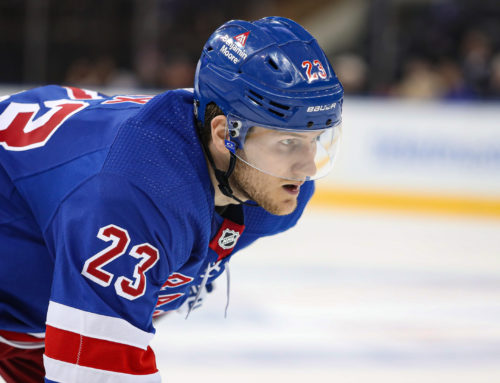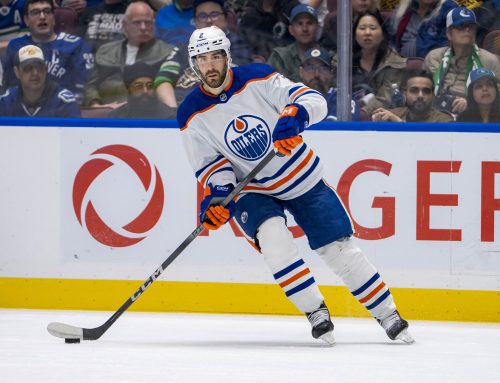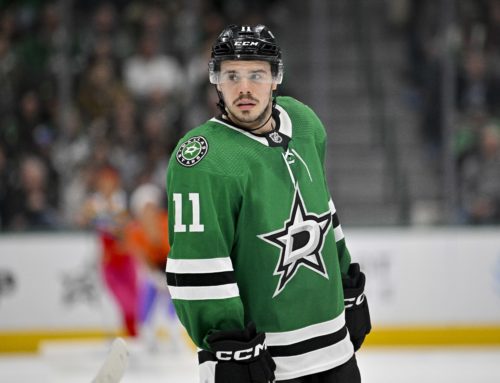Justin Faulk vs. Justin Schultz
Rick Roos
2014-05-07

Which Justin do you prefer in fantasy hockey – Faulk or Schultz?
There was a lot of positive response to my recent Cage Match pitting Dougie Hamilton against Jacob Trouba, so I'll focus this week on another pair of young rearguards – Justin Faulk and Justin Schultz. It's safe to say that both have fallen at least somewhat short of lofty expectations in their brief NHL careers; but is either one poised for a big breakout soon, and which one is the better for your league?
Career Path and Contract Status/Cap Implications
I was surprised to look back and realize that Faulk was only a second round pick (37th overall) for the Hurricanes in 2010. But Carolina quickly realized the talent that had fallen into its lap, and Faulk was in the NHL to stay by the 2011-12 season. Fast forward to now and Faulk has played 180 NHL games and, perhaps most impressively, was a member of Team USA in the Sochi Olympics before he even turned 22 (although for what it's worth he was a healthy scratch for the first four games of the tournament and played less than ten combined minutes in the two final games).
Schultz is nearly two years older than Faulk but has played in 58 fewer games. Much of that has to do with Schultz's well documented draft and contract history, which saw him selected 43rd overall by the Ducks back in 2008, go unsigned for nearly four years, then deregister from college in the spring of 2012 and become a free agent after the Ducks were unable to come to terms with him during their 30 day signing window. Schultz had many suitors, ultimately signing a two year deal with the Oilers that had him in the NHL to stay on opening day of 2012-13.
For 2013-14, both players technically had salary cap hits of less than $1M, with Faulk's ($0.84M) being just a bit lower than Schultz's ($0.925M). But Schultz's overall two year deal ended up paying him more than $7.5M, thanks in large part to bonuses, while Faulk had more meager bonuses and only ended up earning $2.7M on his initial deal.
Faulk is already signed for the next six seasons on a deal that brings with it a $4.83M yearly cap hit, while Schultz is an RFA this summer. With Edmonton in need of all the rearguard talent it can get, and Schultz's camp having already demonstrated shrewd negotiation, Schultz could well end up with a deal that rivals Faulk's. Those in cap leagues should watch this situation closely.
Ice Time
Although there's only two years of data for Schultz and three years for Faulk, it'll be interesting to see how their Ice Time has evolved and where they've ranked on their respective teams.
|
Season |
Total Ice Time per game (with rank among team's defensemen) |
PP Ice Time per game (with ranks among team's defensemen) |
SH Ice Time (with rank among team's defensemen) |
|
2013-14 |
23:24 (JF) – 2nd 23:20 (JS) – 1st |
2:07 (JF) – 4th 3:26 (JS) – 1st |
2:25 (JF) – 2nd 0:58 (JS) – 7th |
|
2012-13 |
24:00 (JF) – 1st 21:26 JS) – 2nd |
2:38 (JF) – 3rd 3:12 (JS) – 1st |
2:59 (JF) – 1st 0:34 (JS) – 6th |
|
2011-12 |
22:50 (JF) – 1st |
3:02 (JF) – 3rd |
1:49 (JF) – 3rd |
These numbers clearly show that – like Jacob Trouba – Faulk has been an integral member of the Hurricanes defense from day one. In Faulk's case he actually led Carolina in overall Ice Time as a rookie during a season where he was only 19 year old when it began. However, seeing that and his Ice Time data for the past two seasons, we have to be concerned that Faulk already might be in – or be at risk of falling into – a "too NHL good for his own fantasy good" situation where, like Trouba and John Carlson, his value in "real life" hockey holds him back from higher point production.
But as of now, Faulk's situation seems to be a bit less concerning than Trouba's or Carlson's. Although like those two Faulk received more SH Ice Time than PP Ice Time in 2013-14 (and 2012-13 as well), his SH Ice Time is far more reasonable, as while Carlson had 3:44 per game (third highest among NHL defensemen) and Trouba 2:55 per game (tied for 28th highest among NHL defensemen), Faulk's 2:25 was only 61st. Plus, Faulk's SH Ice Time was down by more than 20% from 2012-13, whereas Carlson's was up by over 30%.
But Faulk owners shouldn't be too quick to breathe a sigh of relief, since Faulk's 32 points in 76 games projected to 34 in 82, which was three points behind Carlson's 37 (in 82 games) and two points less than Trouba's projected 36 (from 29 points in 65 games). Of course some of that had to do with the poor Carolina offense (24th in goals scored, compared to Washington at 12th and Winnipeg at 14th); but if you look at the 33 defensemen with more overall Ice Time per game than Faulk had in 2013-14, 29 also had 2:00 or more of PP Ice Time and Faulk's points per game average was lower than all except four of those 29 (Dion Phaneuf, Tobias Enstrom, Andy Greene, Jack Johnson). Not good to see.
With Schultz, there's no issue with too much SH Ice Time, as so far the Oilers are tailoring his Ice Time to suit his more offensive talents. But he's far from just a PP specialist, as his 23:20 overall Ice Time was nearly identical to Faulk's and 1:45 more than any other Oiler defenseman for 2013-14. Of course, it's never a good sign to have by far the leading Ice Time among all defensemen on a team with the league's third worst goal differential (-67) to go along with his +/- rating of -22, which was among the ten worst of all NHL defensemen who played in 70+ games during 2013-14.
In short, although there's little doubt the overall Ice Time for each player will be either at or above their 2013-14 levels, that doesn't automatically bring with it the positive expectations that it normally would.
Secondary Categories
|
Season |
PIMs (per game) |
Hits (per game) |
Blocked Shots (per game) |
Shots (per game) |
PP Points (per game)
📢 advertisement:
|
PDO (5×5) |
|
2013-14 |
0.48 (JF) 0.21 (JS) |
1.23 (JF) 0.40 (JS) |
1.34 (JF) 1.44 (JS) |
2.00 (JF) 1.47 (JS) |
0.10 (JF) 0.16 (JS) |
988 (JF) 994 (JS) |
|
2012-13 |
0.39 (JF) 0.16 (JS) |
1.66 (JF) 0.31 (JS) |
1.23 (JF) 0.73 (JS) |
2.00 (JF) 1.77 (JS) |
0.08 (JF) 0.31 (JS) |
1009 (JF) 982 (JS) |
|
2011-12 |
0.44 (JF) |
1.71 (JF) |
1.29 (JF) |
1.53 (JF) |
0.18 (JF) |
986 (JF) |
Aside from Shots, Faulk's totals from his rookie season represent either his best or second best output in every one of these categories. That's certainly not the trending you want to see, although in some cases (e.g., PIMs and Blocked Shots) the differences were very minor from season to season.
Schultz's shot totals are quite low for a scoring defenseman, and in fact only one other defenseman (Alec Martinez) who scored 11 or more goals in 2013-14 averaged fewer shots per game than Schultz's 1.47. So not only is Schultz's lack of shooting a source of frustration in leagues where shots are a category, but it's likely keeping his point totals down as well.
Schultz is also a legitimate category killer in Hits, having put up an equal number (15) as PP Points in 2012-13! And although his Hits per game average improved slightly in 2013-14, there were only two other defensemen who played more games than Schultz yet had fewer Hits per game – Keith Yandle (22 Hits in 82 games) and Alex Pietrangelo (24 Hits in 81 games), and those guys compensated by respectively finishing seventh and eighth in defenseman scoring, while Schultz was only tied for 38th.
On a more positive note, Schultz nearly doubled his Blocked Shots per game average from his rookie season to 2013-14. But for what it's worth his rate is now barely ahead of Yandle's (1.28 per game) and still well below Pietrangelo's (2.02 per game).
Both Faulk and Schultz saw their best PP production as rookies, then produced at half the rate in their next season(s). While some of the blame lies in the PP ineptitude of their teams (Edmonton was 8th in PP conversion % in 2012-13 but 21st in 2013-14, while Carolina was 28th and 27th over the past two seasons after being 20th in 2011-12), this is not a good sign for either player as an individual.
In terms of PDO, every season for each player was within the 970-1030 "normal" range. That's nice to see in that at least their production hasn't been unsustainably lucky thus far; however, since neither one was victimized by particularly bad luck, we can't automatically expect them to get a bump in production that would come from luck swinging more in their favor in the coming seasons.
Who Wins?
For points-only leagues, Schultz wins, as his glaring weaknesses (plus/minus, Hits, Shots) don't matter. And although most GMs are smart enough to realize Schultz's comparatively better value in points leagues, which in turn would make him cost a lot more than Faulk, I'm still picking Schultz because Faulk's points might have a Trouba/Carlson type of ceiling and Schultz could really see his points skyrocket if the Oilers find a way to connect the dots as a team.
It's a tougher decision in one-year multi-cat leagues. Although Schultz really hurts a team in plus/minus, Hits, and Shots, not only might Faulk have a potential points ceiling, but unlike Trouba and Carlson he doesn't provide outstanding numbers in any secondary category to balance out that weakness. I still think Faulk gets the narrow edge because Schultz is a genuine category killer in more than one area, which would be hard for your team to compensate for.
The choice in keeper leagues is heavily influenced by two key questions – will the Oilers right their ship and become a better team (thus leading to Schultz improving in at least points and plus/minus) and will Faulk suffer the same "too NHL good for his fantasy good" fate as John Carlson (thus keeping his points total low). For what it's worth, my take is the Oilers are still not on the cusp of turning things around and Faulk is indeed heading down the path of being Carlson 2.0.
But beyond that, I think Schultz has gone from being overrated, overhyped and overvalued to, if anything, just the opposite. Some of his owners probably paid through the nose to get him in 2012, and have seen him put up okay but not great point totals, with some terrible secondary stats. The reality is players who are overtly perceived as a disappointment often end up being bargains in relation to their actual value, which isn't as low as it might seem despite them falling short of sky high expectations.
For a guy like Faulk, his owners are likely more frustrated than disappointed, as the perception is that Faulk's situation failed him, not that Faulk himself failed. His owners are probably figuring that Faulk's talent will find a way to come to the surface, so they don't want to give up on him before that happens. Plus, they saw that he was named to the USA Olympic team, which at minimum allowed the star status of many Olympians to rub off on him. As a result, Faulk's value is likely higher than it should be – high enough that the edge goes to Schultz in keeper leagues.
As for what effect Kirk Muller's firing will have on Faulk, I'm guessing little to none this season and most likely not much in the coming years. For comparison we need only look to Carlson, who's had a similar role under three coaches in his young NHL career. In short, if a player falls into the "too NHL good for his fantasy good" trap, it's hard to escape even with a coaching change.
| Cage Match – biggest misses of the past year | |||
| Alex Steen vs. Zach Parise | |||
| Dougie Hamilton vs. Jacob Trouba |




 NYI
NYI PHI
PHI DAL
DAL VGK
VGK CHI
CHI T.B
T.B WPG
WPG UTA
UTA
 CBJ
CBJ BOS
BOS N.J
N.J CGY
CGY CAR
CAR WSH
WSH STL
STL
